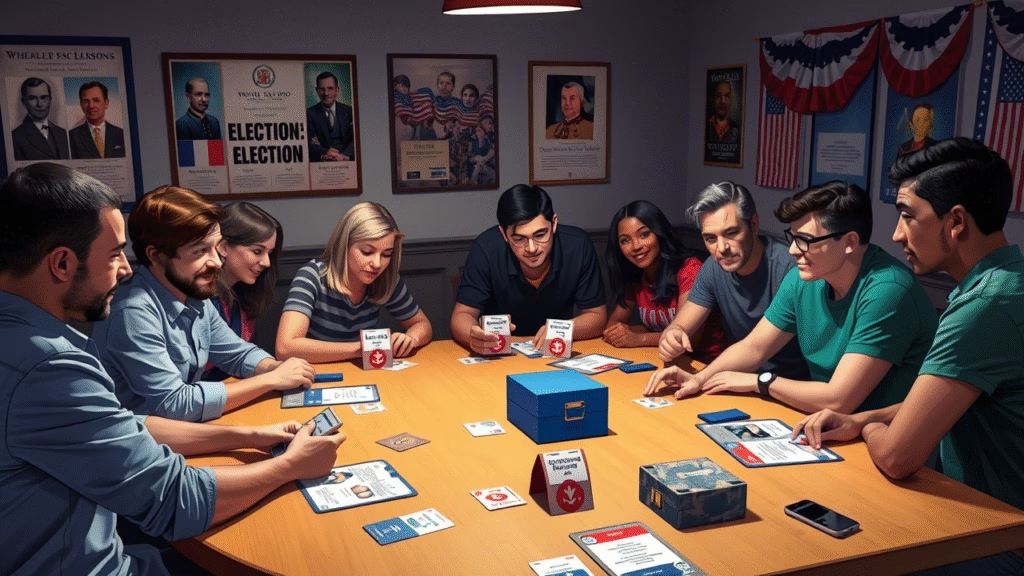Table of Contents
- From Campaign Trail to Controller
- Why Politics Makes Games Matter
- Mechanics Inspired by Constitutions and Ballots
- Storytelling That Mirrors Parliamentary Drama
- Multiplayer Diplomacy: Turning Players into Politicians
- Data-Driven Politics: Balancing Gameplay With Real Polls
- Ethical Pitfalls and the Duty of a Game Design Company
- Monetization & Marketing: Selling Democracy Without Selling Out
- Future Trends
- Getting Started
1. From Campaign Trail to Controller
Real‑world politics has marched off the evening news and onto your console. Just a decade ago, developers tiptoed around hot-button issues. Today they build entire franchises, from Democracy 4 to Cities: Skylines II around taxation, urban policy, and social justice. Mainstream studios and every ambitious game design company see political systems not as off-limits, but as an untapped design space.
Moreover, the market rewards this risk. According to Newzoo’s 2025 report, simulation titles with explicit political mechanics grew annual revenue by 18 percent outpacing shooters and sports games. Players want agency that feels consequential, and nothing feels more consequential than reshaping a digital nation‑state. Consequently, publishers are investing in political consultants the same way they once hired military advisors.
2. Why Politics Makes Games Matter
First, politics raises the emotional stakes. When a player approves a controversial law, they quickly realize that policy choices ripple through the entire simulation. This immediacy conveys weighty concepts budget deficits, civil liberties, voter backlash far better than a lecture or textbook ever could.
Second, political content boosts replay value. Every electorate reacts differently to radical reforms, so no two campaigns unfold the same way. Transitioning from a welfare-heavy social democracy to a laissez‑faire technocracy demands fresh tactics, new alliances, and updated messaging. In turn, players keep returning to test divergent ideologies.
Finally, politics elevates games as cultural artifacts. As the medium matures, critics demand deeper themes. Titles that tackle gerrymandering or the environmental cost-benefit of nuclear power prove that our industry can spark meaningful public debate one interactive scenario at a time.
3. Mechanics Inspired by Constitutions and Ballots
Designers no longer borrow mechanics solely from board games; they now mine the procedures of legislatures, referendums, and court rulings.
Dynamic Constitutions
Instead of static rule sets, modern sims let players amend constitutional articles. If a balanced‑budget clause throttles spending on education, you can repeal it assuming you survive the referendum. This mechanic teaches constitutional rigidity versus adaptability in tangible terms.
Multi‑Stage Elections
A single election night feels shallow compared with real electoral cycles. Therefore, advanced titles employ multi‑round primaries, televised debates, and runoff votes. These stages build narrative tension and force players to pivot strategy as poll numbers swing.
Lobby & Influence Systems
Mechanically, lobbying manifests as a resource sink and a relationship builder. By modeling interest groups environmentalists, defense contractors, unions designers highlight the tug‑of‑war behind every bill. Smart balancing ensures no faction becomes a mere cash sponge; each offers unique perks or unlocks that change how the nation evolves.
4. Storytelling That Mirrors Parliamentary Drama
While mechanics deliver systemic depth, storylines deliver human context.
Branching Ideological Arcs
Instead of binary good‑versus‑evil plots, political games thrive on nuanced ideological arcs. One path sees the player curb carbon emissions at the cost of industrial jobs; another preserves industry but spikes pollution. Both outcomes feel bittersweet, reflecting real policy trade‑offs.
Emergent Scandals
Scandals add a layer of unpredictability reminiscent of real‑world leaks and whistleblowers. Perhaps your transport minister faces bribery charges halfway through your infrastructure rollout. You must decide: fire them to preserve credibility, or protect them to keep party unity? Such emergent narratives humanize the abstractions of GDP charts and voter graphs.
5. Multiplayer Diplomacy
Single‑player simulations excel at showing cause and effect, yet politics is inherently social. Consequently, studios like Paradox Interactive elevate diplomacy to headline status in multiplayer grand strategy titles.
Asynchronous Negotiation
Not every player logs in simultaneously, so diplomacy interfaces now resemble email inboxes. You draft treaties, attach concessions, and await digital signatures. This asynchronous play respects time zones while fostering real negotiation skills.
Public vs. Secret Deals
Games differentiate between public parliamentary votes and covert back‑room bargains. Revealing a hidden treaty could tank coalition trust or spark a lucrative new alliance. Players, therefore, juggle transparency with strategic opacity, mirroring real leaders’ dilemmas.
6. Data‑Driven Politics
Balancing complicated policy webs once consumed months of QA testing. Today, analytics pipelines automate the heavy lifting.
Live Polling Feeds
A forward‑thinking game design company now scrapes open polls on real issues tax brackets, immigration attitudes, healthcare support and pipes anonymized data into in‑game electorate models. When public sentiment shifts in reality, the simulation subtly adapts, keeping scenarios relevant.
Machine‑Learning Balancers
Instead of hand‑tweaked spreadsheets, machine‑learning agents run thousands of AI playthroughs overnight. They flag runaway strategies say, a loophole that grants infinite budget surplus so designers can patch before launch. As a result, what once took weeks is resolved in a single training pass.
7. Ethical Pitfalls and the Duty of a Game Design Company
Yet weaving politics into entertainment carries risk.
Avoiding Partisan Propaganda
Players come from diverse ideological backgrounds. If a title crowns one doctrine the “win state,” it alienates half its audience. Ethical studios therefore present multiple viable routes to prosperity, each with trade‑offs, rather than treating one ideology as objectively correct.
Modeling Sensitive Conflicts
Some subjects genocide, voter suppression, extremist violence require careful handling. The best studios consult historians and affected communities, embedding trigger warnings and optional content filters where appropriate.
In short, the burden falls on every game design company to balance creative freedom with social responsibility. A compelling simulation should illuminate civic processes, not trivialize human suffering.
8. Monetization & Marketing
Free‑to‑play monetization often clashes with political integrity.
Cosmetic‑Only Microtransactions
To avoid “pay‑to‑rule,” savvy studios lock policy mechanics behind gameplay, not wallets. They monetize map skins, avatar outfits, and cosmetic cabinet chambers instead. This preserves competitive fairness while funding ongoing updates.
Community‑Driven DLC
Expansion packs thrive when they address real campaigns. For example, a climate‑change DLC launched alongside COP31 news cycles. Because the topic trended globally, social media chatter boosted organic reach and conversion rates. Pairing releases with real‑world events provides a marketing tailwind without resorting to clickbait.
Future Trends
Looking ahead, three technologies promise a revolution.
Large-Language-Model NPCs
Imagine debating a dynamically generated parliament where each legislator crafts arguments via LLMs. Responses evolve with every bill amendment, producing unscripted oratory that feels uncannily alive.
Procedural Rhetoric Engines
Ian Bogost coined “procedural rhetoric” to describe persuading through rules. Future engines will turn that theory into practice, auto-generating persuasive scenarios based on current events. If real inflation spikes, your in-game economy might model hyperinflation overnight, forcing emergency measures.
Mixed-Reality Town Halls
VisionOS and next-gen headsets will teleport players to holographic rallies. Gesturing at 3‑D policy graphs while fielding live voter questions could become the new endgame loop, merging civic education with immersive spectacle.
Getting Started
Ready to enter the arena? Keep these guidelines in mind:
- Research Relentlessly. Skim academic journals on comparative politics. Authenticity earns trust.
- Prototype Systems First, Narrative Second. If your tax algorithm fails, fancy cutscenes won’t save the project.
- Consult Policy Experts Early. They catch logical holes, like impossible deficit math before players do.
- Plan for Localization. Political jargon changes by region; partner with native speakers to avoid mistranslations.
- Lean on Community Feedback. Beta forums spot balance exploits and highlight cultural blind spots.
Finally, remember that every great political game starts with a clear design vision and the courage to tackle complex, sometimes uncomfortable truths. If your studio pursues that mission with transparency and empathy, you won’t just ship a game you’ll craft a civic sandbox that enlightens players worldwide.
Read More: Is PUBG Cross-Platform With PC



